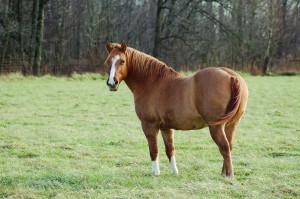Ask the Vet: Feeding Glucosamine to Insulin Resistant Horses

My 21-year-old gelding has Cushing’s and IR and foundered twice before an appropriate pergolide dose was reached. He also now has arthritis problems and has had his joints injected. I wanted to start him on a daily joint supplement but was advised against it due to human diabetics reacting to glucosamine. What are your thoughts on this? Thank you. Meggie
Dear Meggie,
I actually get this question a lot and have a ready answer for you (it’s probably okay to feed glucosamine to horses that are on sugar-restricted diets), but if you’re not comfortable with this, by all means choose a joint product without glucosamine. There are lots of other ingredients in joint supplements that may help your horse, such as chondrotin sulfate, hyaluronic acid, MSM, cetylated fatty acids, and herbs like Devil’s Claw, Yucca, Boswellia and others.
Why do I think it’s probably okay to feed glucosamine to horses that are not supposed to have grain, molasses and other feeds high in sugars? Several reasons. First, a recent study in well-controlled human diabetics showed no effects of glucosamine supplementation on long-term blood sugar levels or diabetes management. Second, a new equine joint supplement on the market that contains glucosamine was given at up to five times maintenance levels for 84 days (that’s 36 grams of glucosamine daily). In two different safety studies of this supplement, no adverse effects on blood sugar levels or any clinically significant effects on any biochemical parameters were seen. Finally, the caution that the NASC requires be on all supplements containing glucosamine came from the FDA, who based it off data from a study of injectable glucosamine.
Because your horse has a complicated medical condition, I recommend you speak with your veterinarian before making any changes to his regimen, whether it’s adding a supplement, soaking his hay or changing his grain.